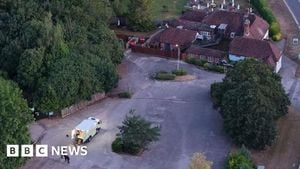Leningrad Oblast has set ambitious goals to comprehensively manage its municipal solid waste (MSW), planning to achieve 100% sorting by the year 2027. This initiative was formally announced by Governor Alexander Drozdenko during a meeting with officials from the region's Legislative Assembly on February 25, 2024.
Governor Drozdenko emphasized the importance of processing waste locally, stating, "100% of waste will be processed at waste treatment plants or sorting lines because we will not transport waste from Podporozhye." The initiative reflects broader efforts within the region to improve waste management practices, reduce environmental impact, and promote sustainable living.
The proposed plan involves innovative technologies aimed at processing and reusing waste rather than simply discarding it. According to Drozdenko, out of all the waste collected, approximately 25% will be transformed back to useful materials. The remaining waste will undergo treatment to generate energy or process it down to inert mass instead of filling landfills.
This strategic approach is not just about waste reduction but also about rethinking how communities engage with their waste. Drozdenko noted, "The remaining waste will consist of about 50%. Of these, 25% will be organic, with the rest being inert mass to be utilized." This dual focus on efficiency and sustainability marks Leningrad Oblast as a progressive leader within Russia's waste management sector.
To support these goals, the region has secured significant financial backing. The federal government has confirmed co-financing for national projects, amounting to 36 billion rubles, to be dispensed between 2025 and 2027. This investment is expected to facilitate advanced waste processing technologies and the construction of necessary infrastructure to handle the sorting and treatment processes effectively.
Such funding aligns with Leningrad Oblast's broader environmental goals and can serve as a potential model for other regions grappling with waste management. With the backing of substantial federal support, authorities are more equipped than ever to progress toward their goal of zero waste sent to landfills.
The region's commitment to waste management reform is part of larger national trends focusing on sustainability, resource conservation, and circular economy principles. The drive to innovate reflects growing public concern about environmental issues and supports international movements aiming to tackle ecological crises.
Critics and community members alike have expressed cautious optimism about the initiative. Successful execution will depend not only on adequate funding and technology but also on community involvement and education about waste sorted at the source. After all, every resident plays a role in this collective effort.
With determination and strategic investment, Leningrad Oblast is poised to significantly reduce its ecological footprint and lead the way as communities across Russia revaluate their waste management practices. Governor Drozdenko's confidence remains high, stating, "There is no doubt at all we will succeed." The road to 100% sorting of municipal solid waste may be challenging, but the vision for trashless communities is clear and reinforced by action.



